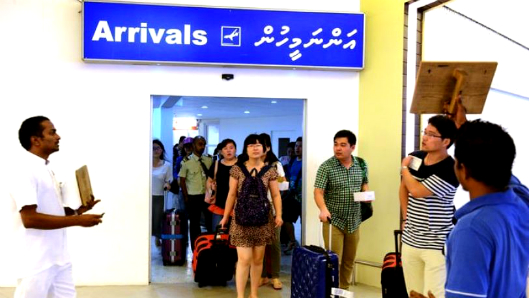A petition calling for sweeping changes to resort employees’ working conditions and a minimum wage has collected two thousand signatures during its first five days.
The Tourism Employees’ Association of Maldives, which launched the petition, said it had amassed signatures from workers on 17 resorts since last Wednesday.
“Signing for new hopes and rights,” the group said on its Facebook page. “Keep going [with] the great work of humankind.”
The petition demands a minimum monthly wage of US $600 across the sector through an amendment to the Employment Act.
There is currently no minimum wage and the petition says that wage rates have not increased in the sector for 10 years.
The workers are also asking for quotas to require 80 per cent of tourism employees in the country to be Maldivian, which would require big changes in the hiring practices of resorts.
Current laws require 50 per cent of resort employees to be Maldivians, but the rule is not widely enforced. The sector employs some 11,426 Maldivians and 16,342 expatriate workers, meaning that overseas employees constitute 59 per cent, according to preliminary figures for the 2014 census.
TEAM also wants the president to honour a pledge to make shares in resorts available to their rank-and-file employees, a rarity in a country where resorts are generally owned by private companies controlled by a few individuals.
In February 2014 President Abdulla Yameen said that by the end of the year, a number of resorts would be floating a portion of their shares to the public, and urged Maldivian employees to become stakeholders.
The president said that share ownership would be a “lucrative addition to their current income from salary and other perks through employment at these resorts”, according to a press release issued at the time.
Speaking at the opening of the Sun Siyam Iru Fushi resort, Yameen also said the Sun Travel resort group would float up to 40 percent of its shares to employees in the coming years.
However, the pledge of shares for resort employees has not so far become a reality.
The petition also asks for a 12 per cent service charge to be applied and for 99 per cent of that to be distributed “fairly” among tourism employees, as set out in the Employment Act.
TEAM’s supporters are seeking the right to form a union, as set out in the constitution, and the right to protest in resorts, which was banned in 2012 under the Freedom of Assembly Act.
The law says that protests can only be held in resorts and in air and sea ports after a special permit from the police based on the advice of the military, but TEAM cites the constitution’s guarantee of the right to peaceful protest.
Over the past few years, resort workers have occasionally tried to launch protests.
Workers who had been fired from Sheraton’s Maldives luxury resort for demanding union recognition protested near the Sheraton Maldives Full Moon Resort and Spa in February, according to the website of the International Union Federation.
Carrying banners with slogans such as “Sheraton fully booked — no room for human rights”, the dismissed workers carried out a boat picket around the resort, while employees came to the beach and waved in support.
In February 2013, an employee strike in Vaavu Atoll Alimathaa resort resulted in 27 employees being fired by management.
According to Haveeru, Ahmed Adeeb, the tourism minister, said at the time that protests in resorts would affect tourists both directly and indirectly.
“Such things must not be encouraged by anyone. Especially when it is something banned by law, it must not happen. No one should encourage or give room for such things,” Adeeb said.
Officials from the Tourism Ministry were unavailable for comment at the time of press.
On Thursday, about 50 employees from the international airport in Seenu atoll Gan protested over a new salary structure which they said would result in lower pay than before. They stopped protesting when management agreed to return to the previous wage structure.
